

INFP Personality Type Profile. By Dr.
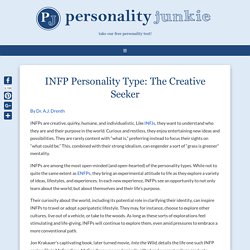
A.J. Drenth INFPs are creative, quirky, humane, and individualistic. Like INFJs, they want to understand who they are and their purpose in the world. Curious and restless, they enjoy entertaining new ideas and possibilities. [Enneagram Type 4] Type Four: The Individualist (Timeless' Description) Tests. This page is dedicated to various tests that we’ve created for you to enjoy.
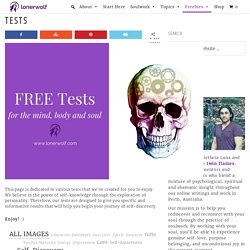
We believe in the power of self-knowledge through the exploration of personality. Therefore, our tests are designed to give you specific and informative results that will help you begin your journey of self-discovery. Enjoy! :) INFP personality. Mediator personalities are true idealists, always looking for the hint of good in even the worst of people and events, searching for ways to make things better.
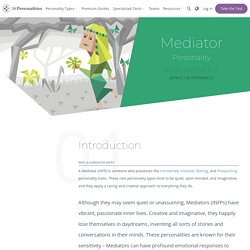
While they may be perceived as calm, reserved, or even shy, Mediators have an inner flame and passion that can truly shine. Comprising just 4% of the population, the risk of feeling misunderstood is unfortunately high for the Mediator personality type – but when they find like-minded people to spend their time with, the harmony they feel will be a fountain of joy and inspiration. Being a part of the Diplomat Role group, Mediators are guided by their principles, rather than by logic (Analysts), excitement (Explorers), or practicality (Sentinels).
When deciding how to move forward, they will look to honor, beauty, morality and virtue – Mediators are led by the purity of their intent, not rewards and punishments. 16 Personality Factors. The Sixteen Personality Factor Questionnaire (or 16PF),[1] is a multiple-choice personality questionnaire which was developed over several decades of research by Raymond B.
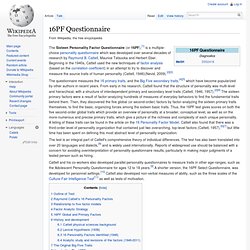
Cattell, Maurice Tatsuoka and Herbert Eber. Beginning in the 1940s, Cattell used the new techniques of factor analysis (based on the correlation coefficient) in an attempt to try to discover and measure the source traits of human personality (Cattell, 1946)(Nevid, 2009).[2][3] The questionnaire measures the 16 primary traits, and the Big Five secondary traits,[4][5] which have become popularized by other authors in recent years. From early in his research, Cattell found that the structure of personality was multi-level and hierarchical, with a structure of interdependent primary and secondary level traits (Cattell, 1946, 1957).[2][6] The sixteen primary factors were a result of factor-analyzing hundreds of measures of everyday behaviors to find the fundamental traits behind them. 38 Vintage Conversation Rules. Editor’s note: The excerpt below comes from a book published in 1875: A Gentleman’s Guide to Etiquette by Cecil B.
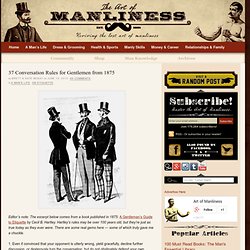
Hartley. Hartley’s rules may be over 100 years old, but they’re just as true today as they ever were. 9 Qualities Of Truly Confident People. Character Strengths and Virtues. The strengths and virtues[edit] CSV defined character strengths as satisfying most of the ten following criteria.
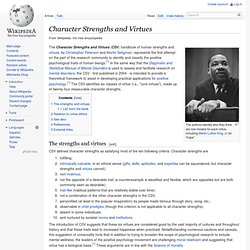
Character strengths are The introduction of CSV suggests that these six virtues are considered good by the vast majority of cultures and throughout history and that these traits lead to increased happiness when practiced. Notwithstanding numerous cautions and caveats, this suggestion of universality hints that in addition to trying to broaden the scope of psychological research to include mental wellness, the leaders of the positive psychology movement are challenging moral relativism and suggesting that virtue has a biological basis.[1] These arguments are in line with the Science of morality. Curiosity Is as Important as Intelligence - Tomas Chamorro-Premuzic. By Tomas Chamorro-Premuzic | 11:00 AM August 27, 2014 There seems to be wide support for the idea that we are living in an “age of complexity”, which implies that the world has never been more intricate.
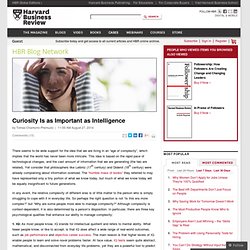
This idea is based on the rapid pace of technological changes, and the vast amount of information that we are generating (the two are related). Yet consider that philosophers like Leibniz (17th century) and Diderot (18th century) were already complaining about information overload. Dunning Personality Type Experts. 9types.com - Enneagram tests, type descriptions, forums. Best-Fit Type : Exploring the Multiple Models of Personality Type. The following is adapted from Linda V.
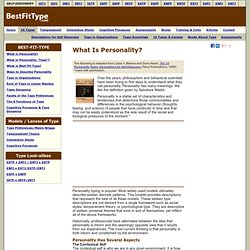
Berens and Dario Nardi, The 16 Personality Types: Descriptions for Self-Discovery (Telos Publications, 1999) *Used with permission. Over the years, philosophers and behavioral scientists have been trying to find ways to understand what they call personality. Free, Scientific Personality Tests Online. Four Keirsey Temperaments. Great Ideas in Personality. MBTI® How Judgers and Perceivers Approach Goals. How to Grow Your Personal Brand When You're an Introvert. HumanMetrics Personality Test. Insights - Out of Character: The Hidden Forces That Change Who We Are. Integral Personality. Is Polygamy the most logical social unit on an evolutionary basis? +Earl Hollar -- now you're getting into the can of worms that is relationship titles.
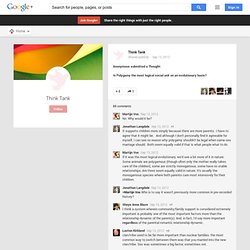
Polyamorous can be anything from polygamous to whatever the people choose. Outside of religious polygamy, it's harder to say. Personally, I've got an ex-wife and ex-husband. But, being as how we live in the US that was not legal. Was that polygamous? The biggest problem that I see is that outside of religious polygyny which does behave as +Robert Shea proposes, we have very little empirical data about the polyamorous and/or polygamous lifestyles. To speak to the +Robert Shea's last statement, though -- he's still assuming a mono-cultural grouping. IMO, human behavior on this level is too complex for simple mathematic formulas. The Most Alpha Myers-Briggs Type? Mirror, mirror on the wall.
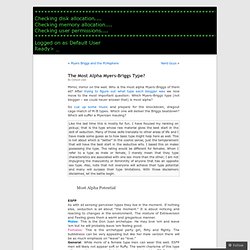
Who is the most alpha Myers-Briggs of them all? After trying to figure out what type each blogger was we now move to the most important question: Which Myers-Briggs type (not blogger – we could never answer that) is most alpha? So cue up some music and prepare for the knockdown, dragout cage-match of M-B types. Which one will deliver the Briggs beatdown? Which will suffer a Myersian mauling? The Myers & Briggs Foundation.
The Myers-Briggs Personality Types. Traditionalist | SP Experiencer | NF Idealist | NT ConceptualistISTJ | ISFJ | ESFJ | ESTJ | ISTP | ISFP | ESFP | ESTP | INFJ | INFP | ENFP | ENFJ | INTJ | INTP | ENTP | ENTJ The Myers-Briggs Personality Types according to Craig Welcome to my web site on the different Myers-Briggs personalities. I have collected information from several resources, books, lectures I have attended, and magazines (so, no, I did not write the majority of this). This website is strictly for my family, coworkers, and friends. I felt that I needed to create a site which I could share with others what I have learned over the years and to introduce them to important concepts which could improve their lives better.
Myers-Briggs Type Indicator. Model of personality types A chart with descriptions of each Myers–Briggs personality type and the four dichotomies central to the theory The Myers–Briggs Type Indicator (MBTI) is an introspective self-report questionnaire indicating differing psychological preferences in how people perceive the world and make decisions.[1][2][3] The original versions of the MBTI were constructed by two Americans, Katharine Cook Briggs and her daughter Isabel Briggs Myers.[4] The MBTI is based on the conceptual theory proposed by Swiss psychiatrist Carl Jung,[5] who had speculated that people experience the world using four principal psychological functions – sensation, intuition, feeling, and thinking – and that one of these four functions is dominant for a person most of the time.[6] The four categories are Introversion/Extraversion, Sensing/Intuition, Thinking/Feeling, Judging/Perception.
Each person is said to have one preferred quality from each category, producing 16 unique types. A New Map of the Human Brain. Oddly Developed Types. Personality Disorder Article. The Personality Project. Welcome The personality-project is a collection of web pages devoted to the academic study of personality. It is meant to guide the interested student, researcher or serious layperson to recent developments in the field of personality research. Included in the personality-project web pages are historical reviews of the field, links to current research findings from around the world, course syllabi on personality as well as on research methodology with a particular emphasis upon psychometric research, and tutorials to help everyone learn some of the more powerful statistical procedures used in personality research.
Some pages are very technical, some are not. Some are very new, some have not been updated in several years. Personality and Individual Differences Personality is the coherent patterning of affect, cognition, and desires (goals) as they lead to behavior. Personality test based on C. Jung and I. Briggs Myers type theory. Personality Tests.
Personality Test Site. Personality Theories. Personality type. This article is about the generic aspects of type theory. For the book by Jung, see Psychological Types. Clinically effective personality typologies[edit] Effective personality typologies reveal and increase knowledge and understanding of individuals, as opposed to diminishing knowledge and understanding as occurs in the case of stereotyping.
Effective typologies also allow for increased ability to predict clinically relevant information about people and to develop effective treatment strategies.[2] There is an extensive literature on the topic of classifying the various types of human temperament and an equally extensive literature on personality traits or domains. Category:Personality typologies. The concept of personality type refers to the psychological classification of different types of people. Personality types can be distinguished from personality traits, which come in different levels or degrees. According to type theories, for example, there are two fundamental types of people, introverts and extraverts. According to trait theories, introversion and extraversion are part of a continuous dimension, with many people in the middle. The REAL Personality Types Made Relevant.
The Sequence of Archetypes in Individuation. Socionics Inter-type Relations. Type Descriptions. Type psychologique. Un article de Wikipédia, l'encyclopédie libre. Les types psychologiques sont une typologie proposée par Carl Gustav Jung pour caractériser le mode de fonctionnement psychologique d'un sujet. Elle aboutit à distinguer seize types psychologiques, suivant la fonction cognitive dominante (quatre possibilités), son orientation introvertie ou extravertie, et l'orientation de la fonction cognitive auxiliaire sur l'axe complémentaire. Les types psychologiques de Jung doivent être vus comme des outils permettant de diagnostiquer les différences de fonctionnement psychologique entre les individus.
Au lieu de reprocher à une personne son mode de raisonnement, on peut comprendre que cette personne est d'un type différent et donc aborde le monde selon d'autres priorités que les siennes. Les différences de types psychologiques peuvent être utilisées comme un outil pour comprendre les différences de fonctionnement des autres. Introduction[modifier | modifier le code] VisualDNA - Discover - Home. What Is Character? Debunking the Myth of Fixed Personality. What is MBTI?: TheMindBehind.Net. The Myers Briggs Type indicator (mbti) is a professional personality sorter which is used by many psychologists, companies and schools to better understand there clients or staff. Briggs Myers: When I Took This Personality Test, I Didn't Expect It To Be So Accurate. Which Personality Type Are You? I Am An Infp. Socionics Description: The Best INFP Guide Ever Written.
The Imaginative INFp If the INFp had a theme song, it would go thusly: “Vado, ma dove? Oh dei! Se de’ tormenti suoi, se de’ sospiri miei Non sente il ciel pietа. Tu che mi parli al core Guida I miei passi, amore; Tu quel ritegno or togli Che dubitar mi fа.” ** “I go – but where, o gods since for his torment and my pleas Heaven offers no pity? You who speak to my heart, Guide my steps, dear love; Ease that uncertainty, That urges me to doubt.” - LORENZO DA PONTE (1749-1838) The INFp is perpetually caught within that “pondering repose of If” that Herman Melville wrote of in Moby-Dick. He is forever in doubt. //the infp discussion list. About this list: The INFP list was founded in November 1993 by Charles Shepherd, due to the interest he and several others had developed in personality psychology.
INFP Introverted iNtuitive Feeling Perceiving. Introverted iNtuitive Feeling Perceiving "I remember the first albatross I ever saw. ... At intervals, it arched forth its vast archangel wings, as if to embrace some holy ark. INFP personalities - tribe.net. The INFP Personality: How To Get From The Front Door To The Car. The INFP Personality: How To Get From The Front Door To The Car As Introverts, INFPs tend to be quiet and reserved, have few close friends, and expend energy in social situations (as opposed to Extraverts, who tend to gain energy in social situations). [INFP] You know you're an INFP when......